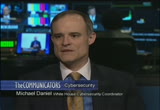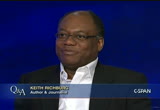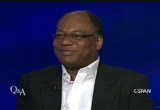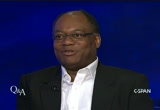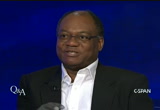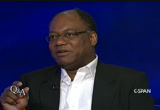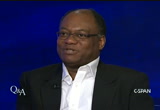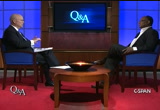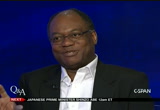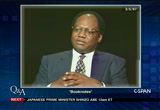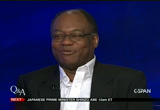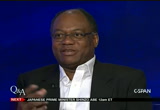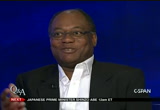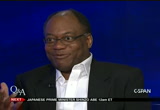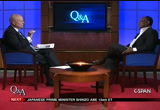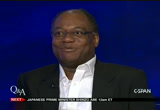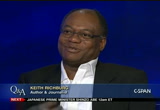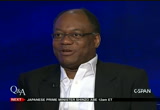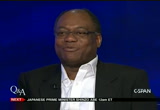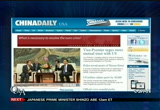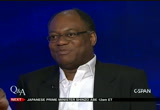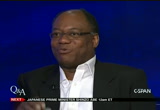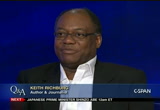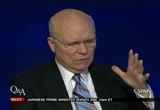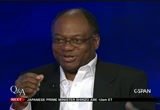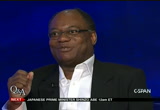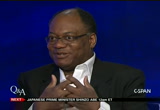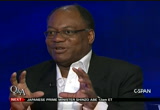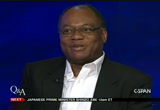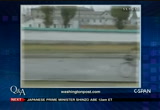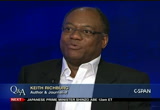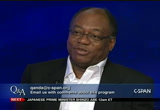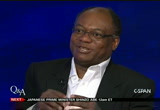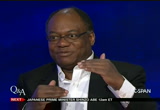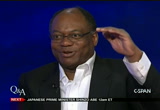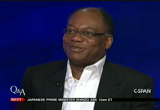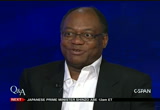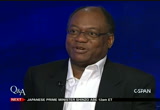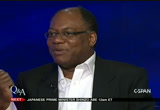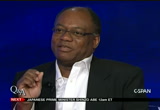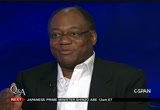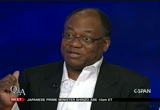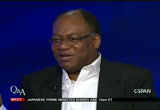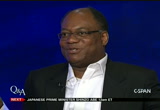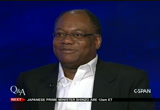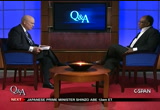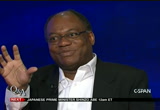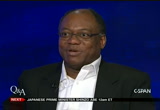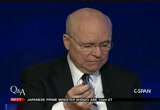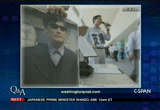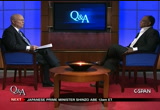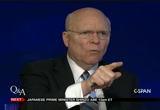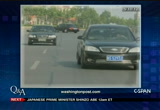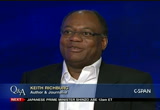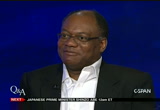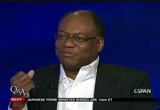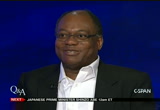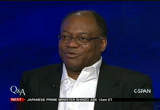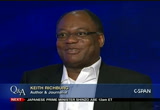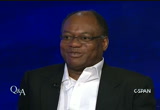tv Q A CSPAN February 24, 2013 11:00pm-12:00am EST
11:00 pm
critical infrastructure sectors are moving together to increase diverse security, because everything is so interdependent. >> the new cybersecurity executive order, monday night on "the communicators" on c-span2. >> this week on "q&a," author and former reporter keith richburg. >> keith richburg, what is the first thing you tell people about china? >> the first thing i tell people when they ask me about china, france coming over, people i meet who are not familiar with it, is there is no one china. it is like talking about the united states as one entity when, in fact, new york is different from texas, or
11:01 pm
california, or someone from the south is different from someone from the north. china is a massive, diverse country. if you come to visit, do not spend all of your time just in beijing. try to go somewhere different. other places are nothing like beijing. when i have friends come to visit, i love to go out and try regional foods. hunan food, middle eastern food, just to give people a flavor that -- when we talk about china, and i am guilty of it too, it is just a short hand. there is no one china. >> what story have you written that has gotten the most attention in china? >> a really good question. i think the story of the
11:02 pm
communist party chief, bo xilai. that exposed a lot of corruption at the high level of the communist party. i think the escape of the blind activist got as much attention from folks back here who are interested in the human rights question. chen guangchen's escape from harsh treatment and interrogation. partly because he is blind and being a human rights lawyer and activist. somehow, he escaped from these conditions. he made his way hundreds of miles from the province to beijing. that really got a lot of attention. that was a pretty dramatic story that happened over the last year. >> how exclusive were those stories to you?
11:03 pm
>> i got the first phone call when he was escorted from the embassy to the hospital. it was partly accidental. he was calling "the washington post" because of a former partner of mine who wrote a book, and he had a chapter devoted to chen guangchen which put chen on the map. i do not think he had a lot of access to the media and he wanted to let "the washington post" know. we had good relationships not only with chen and his allies. they would call us when there were developments, like the case of chen's nephew, who was jailed. we have good contacts. >> you are going to harvard? >> i am. >> what for?
11:04 pm
you have left china for good? >> i have. from one great institution to another. i will be leading a study group on china. i will be looking at different sections of the study group, the rise of the internet. chinese twitter, the impact that has. we will look about the leadership of china to see what that will mean about the possibilities of reform. one session will look at media coverage, specifically american media coverage, of china. and how that shapes perceptions. the foreign media and how we cover things shape how we view china. we write about human rights, china's dramatic growth rates, china as a competitor, their
11:05 pm
education system producing more graduates. i want to look more specifically about that. i want to vote -- to devote another section to chinese political campaigns. being in china, watching the campaigns here, to see how china is thrown up as a bogeyman. china is used to scare voters on one side or the other. a session devoted just to that would be good. i call one, neighborhood bully with a question mark. >> how long total have you spent in china and hong kong? >> hong kong, five years, 1995 to 2000. a lot of that was outside
11:06 pm
traveling to southeast asia. that was the time of the asian economic crisis. this time, it will be three years. at the end of 2009, i went in. president obama was making his first trip there. i was there for that in november. "the washington post" asked me to stay permanently. i stayed until january 2013. my first trip to china was 1985. i got to see china in the 1980's, the 1990's, and most recently. i have seen the development. >> you have been with "the washington post" since what year? >> a summer intern in 1978. >> what different places did you live in in the world since you first when to be a -- went to be an intern? >> 1986, i was in the philippines for four years.
11:07 pm
1991, i went to nairobi, stayed there until 1995. then i went to hong kong. i spent a lot of time in indonesia during that time as well. in 2000, i moved to paris. i became the paris bureau chief for "the washington post." from paris, i was in iraq and afghanistan a bit. i traveled pretty much everywhere. came back to washington in 2005 to be an editor. in 2007, i went to new york to be the new york bureau chief. another fantastic job. i got a piece of the 2008 presidential election at that time. in 2009, they asked me to go back to china. >> you were here in 1997. i want to show a clip of that
11:08 pm
when you were here for a book about africa when you were stationed over there. where did you live? >> nairobi. >> let's watch this. we will continue. [video clip] >> i do not hate africa or the africans. i hate the corruption. i hate the brutality, the inhumanity, the kids who point guns in my face, the big men who scared away billions in the swiss bank account. i hate the propensity of africa to roll over and wallow and endure this suffering without taking it to the streets and doing more to demand their own rights. i hate the people who tossed firebombs to the opposition. i hate the way people can walk by suffering. >> that was a long time ago. 15 years. >> awful stuff. >> what was the impact of that book? >> that book got a lot of
11:09 pm
feedback. not always positive -- i got some negative, but almost all of it was positive. people said to me, the negative side said to me, how could you air this dirty laundry out that will give ammunition to those who want to oppose further aid to africa or for their involvement to africa? there was also a strain of anger from some people saying you are not looking at the good parts of africa. among the people who enjoyed the book, many were african- americans, many were diplomats, they came up to me after book signings, often whispering, saying, i was there, i agree with you, but i do not want to say it. and they would hear me getting shouted down by angry people and would come up afterwards and say, can you sign a copy of the book, because i agree with
11:10 pm
everything you said here. usually people find it on a library shelf. people going into the peace corps have been picking it up. i have gotten a lot of feedback. i went back in 2007, 2006 and looked around to update it. i wrote a new preface to it that took account of obama's election at that point. i wanted to test myself to see if some of those things i wrote then were still true. sadly, many were. >> what impact has this had on anything the president is connected to? >> i said this in the new preface to the book i wrote, taking into account obama's election, it really made the u.s. convinced it was the possibility for black people, specifically. when i saw the idea that this
11:11 pm
guy could rise from a mixed race background and get elected president in a country where his people, people who look like him, are not the majority, it says something good about america. that was the whole point of the book i was trying to get, that some people actually missed, that this was a real place of promise and opportunity for black people. people in africa are looking at the u.s. in a different way. i think the election of obama was a fantastic thing, not just for africa, but it is all over the world. i am amazed when i go to indonesia and i am checking in at the airport and the immigration officer looks at my passport and looks at me and says, obama, number one. taxi drivers in beijing will look over and say, i like obama. he has really changed the perception of african americans, of black people around the world, for some.
11:12 pm
>> what is your reaction after living all over the world to the statement a lot of people make who call this network that america and united states is the greatest country in the world? >> it is a great country. it is an exceptional country in a lot of ways for the reasons i mentioned. the obama election, to me, crystallized in many ways why this is such an exceptional country. i lived in france for five years. i tried to imagine myself, would there ever be a black president in france? i tried to imagine in china, would there ever be a minority? they have 53 minority groups. would there ever be a non chinese elected to any high office in china? i tried to imagine in what other country this would be possible other than the u.s. i tried to stay away from superlatives. i would just say it is an
11:13 pm
exceptional country. that is why it is exceptional. everybody came from somewhere else. at some point, if you go back far enough, everybody came from somewhere else. the fact that people were able to look past color and elect barack obama, someone with the name barack hussain obama, i think makes this an amazing place. >> born in detroit. are your parents alive? >> my father passed away in 2007. >> the last time you were here, he was alive. what would they think of keith richburg and what would they say is the reason you have been so successful and have traveled all over the world? where did it come from? >> i hope they would be proud and happy i did what i always wanted to do. i always wanted to be a writer. i thank "the washington post" for giving me the opportunity to
11:14 pm
live in different places and write. i think they were skeptical. my dad was a factory worker and my mom was a home maker. this idea i was not going to be a lawyer or something they understood where you could make a salary and make money -- a writer, how will you support yourself? to not only do that, but to do that in a way that would make them proud, i think that would make them happy. i think parents are happy when they see their kids happy. i was always chomping at the bit to travel. there is something about growing in the midwest that makes you want to see the rest of the world. in detroit, in those days, going to canada was a big deal. i wanted to travel and see places. the fact that i was able to get a master's degree at the london school of economics, my mom was thrilled at that when she was alive. i could tell when my dad died and i went to his funeral and i heard everyone come up to me and say, he talks about you all the
11:15 pm
time. my dad passed away, and i was cleaning out his house. i found he had saved a lot of old articles of mine, including articles i had written in high school and college. he saved the clippings somewhere. i found these. he never told me that. it was a nice touch. >> where did your interest come from? did you ever have anybody in your life say, they pushed me in that direction? >> it was my parents, my mom and my dad, and primarily my dad. whatever you do, try to be the best. he was the real source of inspiration. he was one of the smartest guys i ever knew. self-read.
11:16 pm
he would say, did you know abraham lincoln said this? i would look it up and it was true. the house was always filled with books and he was a real reader. that part came from him. in terms of inspiration, a lot of people helped me on the way. i did not know how to put my interest in writing with my interest in journalism together. i did not quite know how that clicked until i went to see that movie, "all the president's men." i never knew i would be working at that organization. it all came together and i said, that is exactly what i want to do. i want to be the correspondent. there were great people who helped me along the way. former city editors. don gramm has been a real mentor.
11:17 pm
the former editor of "the post" was with me all the way. >> are you back here for good? >> i would never say that. for now. i always want to be able to travel and go back overseas again. i am not sure i have the chance. i would not say anything is permanent. it was time to move on from "the washington post" and do new things. i wanted to try more writing and teaching. after the book came out, "out of america: a black man confronts africa," a lot of friends have been saying, you have got to write another book. i have not had time to sit down and develop one. as i started to look at it, i am
11:18 pm
54 years old. i do not have a lot of time if i want to write more. i got to be in china at an exciting time. this is the time now to step back and use these last healthy years to try to do more types of writing, specifically, book writing. it is difficult to leave "the washington post" but if i want to write more books and do more things, this was the right time to do it. >> if you live in washington and you pick up "the washington post," this often is contained inside it. it is contained inside "the new york times." is it propaganda? >> the chinese government, the communist party, owned the newspaper.
11:19 pm
they paid to put that in as a supplement. the russians did a similar one. various countries do that. the chinese media is coming into the u.s. in a big way. it does raise questions as to whether newspapers should allow these kinds of supplements inside, but i think as long as it is made clear it is not a product of ours, it is probably ok. they will not financially teardown somebody who was offering to pay money. in this case, it is a tough call. as long as it does not affect the journalism of the newspaper and as long as it is clear it has nothing to do the editorial policy of "the washington post," i think it is ok.
11:20 pm
they are trying to present themselves as objective newspapers. they have their point of view, specifically on their editorial page, but they are trying to do a better job of doing real news. they are getting real competition inside of china, particularly from young chinese who are turning to the media, like chinese twitter, so they know propaganda junk in the paper will not sell any more. they are actually trying. they have got leeway in areas not too overtly political. if they want to look at legal level corruption issues, that is fair game. traffic problems in beijing, obviously fair game. there are areas now, so i would not call it complete propaganda. the editorial page will be tightly controlled. political stories tightly
11:21 pm
controlled. you have a lot of good young journalists working for papers like that trying to push the envelope of censorship. >> keith richburg sitting in beijing, you know there are hundreds of thousands of dollars being spent from the chinese government for this publication to be inserted in "the washington post," does that affect the way you support and how china looks to you? >> it does not affect me. i try to divorce myself from anything that has to do with that. "china daily" set up a lunch as a courtesy to meet the executive editors a couple years ago. i declined to go because i said, that would put me in a bad position. i would go along to them with
11:22 pm
appointments i thought were appropriate. there were others that i declined to go to. as a correspondent, you have to put a little bit of distance between yourself. it may create the perception among some in china we have some kind of relationship with "china daily." we call it the law of church and state between the news side of the paper. i would try to explain to people we have nothing to do with that. i used them as a source and i read it every day. i would get it delivered. the idea that there would be a change in the way i would cover something would not be accurate. >> you live here in this country. you hear politicians. some politicians say we need to spend a lot more money on defense in the southeast asian area, in the china sea area.
11:23 pm
how concerned should we be about the chinese in the future militarily? >> i think it is a worry because they have an not -- have not made their intentions clear. we do not know how much is being spent. only part of their budget is public. there is another section we do not know anything about. it is off the books. their space program, everything about nuclear things. there has been a lot more rhetoric and a lot more words directed both towards the southeast asian companies in terms of the island group, but also towards japan. they argue over what the name of the island chain is. they have made it plain they will push their territorial rights in a lot more of an aggressive way than they did before.
11:24 pm
it is china's way to say, now they are a great power and a rich country and they can no longer be pushed around by smaller countries around them. i personally do not see it opening up yet. this is just my speculation. even generals in the chinese military know outright hostilities would be bad for the region, the economy there, and i think they were hoping to mainly intimidate to get their way so they do not have to have any outright hostilities. when you have got a lot of ships like that in close proximity, there is always a chance someone will do something wrong and someone will pull the trigger. you have to remember how world war i started. i think the u.s. is right to stay on guard there. there has to be some way to bring the tensions down and get the sides talking again as opposed to taking the unilateral
11:25 pm
maneuvers. it is a tough thing to negotiate. >> they own $1 trillion of our debt. the wal-marts of this world have 78% of the products coming out of china. how could you get a war out of this? >> exactly. a shooting war seems to me highly improbable because it would affect not only trade with south east countries, which is as important to them as their trade with us, but it would affect the entire balance of our countries, so increasingly intertwined. i do not see it going to that level.
11:26 pm
1.3 billion people in china. probably more now. >> how many cities have 1 million people in it? >> many. there are cities with over 1 million people now and i have never heard of them. in addition to that, the diversity is within the government. there is no one chinese government view. there is the foreign ministry, which has a more of a willingness to negotiate. there is the military, which has been taking a much tougher line in these island disputes. there is the state council, all kinds of views going on here. even with the media, you see really tough views on some of the island disputes. i think we cannot read one general writing in a military
11:27 pm
magazines saying, we must prepare for war. it means one general is saying and writing that. >> if there is a showdown with north korea, which side would china be on? >> north korea, clearly, but they would have interest in trying to mitigate that as much as possible. i was in north korea in november 2011. >> some video that you shot. >> i shot it with a small camera i could keep concealed. mostly under my jacket. we were told not to shoot a video of most things in north korea. >> did people know you were shooting it? >> i do not think they did. i tried to download things on my computer to make sure they would not be able to confiscate everything i had. when we left the airport, i was part of a small group.
11:28 pm
i saw them going through people's cameras deleting images they did not want seen. i made it clear i did not have it on my camera at the time. i would go back and download it on my computer. >> let's watch. [video clip] >> tourists take the various memorials and attractions around the city. it is really difficult to get a look at daily life since your tour group is kept isolated from ordinary people. you cannot go to restaurants and normal shops and look around. these images were shot from the window of moving buses. we were going through on the way from one tourist attraction to the other, getting into north korea, which is rare for journalists. we were told not to take photographs of everyday people.
11:29 pm
these are rare images. i left my hotel to get images of daily life. you see a city of few private cars. most people walk or ride bicycles. teams walk together to their jobs on construction sites and usually walking behind a leader carrying a flag or red banner. roads are being repaired and new housing being built. it is all in preparation for ceremonies next year, the 101st anniversary of the country's founding leader, still referred to as the great leader. >> what do they think they are gaining by having such a closed society? >> continuing their absolute control, basically. the one thing they always say, you have nothing to end the when you look at the west, specifically south korea,
11:30 pm
because we have everything here and they and the us. if they start allowing in the internet, and newspapers and magazines from abroad, and more western tourists who are allowed to walk around freely and mineral -- mingle, they might see they do have a lot to envy. their country is desperately poor and far behind in terms of any kind of mechanized infrastructure, any kind of transportation infrastructure, agriculture, they are desperately far behind even china, which is pushing north korea to adopt some of their openness. the communism of china is basically communism in name only these days.
11:31 pm
they basically through most ideology aside when the country was opened up. it is now a capitalist haven. they talk at great length at party communists, but it is all about preserving the party's power economically as the country continues to grow. they threw aside most vestiges of communism while ago. north korea, it is about preserving the power of military and the kim dynasty. has nothing to do with karl marx's vision of communism way back. someone to do a fascinating book about how communism diverged into something different in vietnam, china, north korea, then the communism that occurred in europe countries. it is a fascinating split. >> here in china, how much do you see and hear about the
11:32 pm
united states without editing and censorship? >> a lot. chinese are obsessed with the united states in a lot of ways. like to compare themselves. the average people on the street compare themselves to the u.s. and want to know what is happening in the u.s., stories about the u.s. election were on the front page and the editorialized about it. they had editorial cartoons about the u.s. election. that is partly because china was mentioned quite frequently, specifically by mitt romney. they have manipulated their currency. they have allowed the currency to float openly in a relatively constrained band. when i arrived, the currency was about seven, now it is about six. it has strengthened quite a bit
11:33 pm
of. >> do they watch our movies, our television programs, can they read the internet from here, and can they watch youtube? >> the internet is controlled by the great fire wall. that keeps out facebook, youtube, "the new york times" is banned. a lot of western sites are banned, including sites from hong kong and taiwan. a lot of young, savvy chinese have a virtual private networks and they are able to get around the great fire wall. it is a cat and mouse game. the chinese find new ways around it. the government is trying to restrict what people see and read.
11:34 pm
>> if "the new york times" cannot be read in china, how do they buy space to be delivered in this country? >> that is the irony. twitter is banned specifically. the official chinese news agency has a twitter account and they are tweeting every day. they are using it to get their message out but banning it. >> is not one of the daughters of major leader in china going to school now? >> a lot of the leaders, and this is a story that one of my colleagues did, a lot of the leaders send their children overseas for education. a lot send their families overseas to live.
11:35 pm
these are known as naked officials. >> does the public in china know that? >> yes. even though china goes to great lengths to ban what people read, people are very savvy and smart. these things get out there among the chinese public. some of the stories will get translated into chinese and slipped out through chinese twitter. will be taken down but not before it is retweeted a million times. >> can we read it here? >> you can if you read chinese. i wrote stories based on what was in there. i call it the chinese water cooler. it is how we know what average people are thinking in a real
11:36 pm
way. >> living in beijing, how long were you there? >> three years. >> could you read the new york times" there? >> i could get around the fire wall. physically, you could buy the international herald-tribune. >> the chinese were allowed to buy them? >> they could walk up and buy it or not a lot of people could read in english. >> the largest number of students in american universities from other countries from high -- is from china.
11:37 pm
what impact does that have? how many of them come over here? as spies? come over here as spies? >> that is a question i would like to look more at. 15 years ago, the problem with chinese students is they never wanted to leave. the chinese government was reluctant to let people go unless they have families held hostage. people would come here and get the education and find opportunities here and jobs here and not want to leave. now people are starting to go back. some because they are patriotic and sent over by the party and get the education and come back, and another group of young people sent over by families and private money and they realize
11:38 pm
there are more opportunities in china. if you are a young guy or woman interested in a computer startup, you are probably going to do a lot better launching that in china than the u.s. now. a lot more regulation here and the market is crowded. if you are a young designer, you would do better in china. a lot of people come here for the skills and decide they can make their money back in china more than here. that is a fascinating trend. people are starting to go back voluntarily because they see it as a booming, open economy. >> what are they doing better than us? >> several things. better? in a different way. they can build things and move things a lot quicker than we can. that is partly because they do not have our regulatory regime or environmental protection regime. i was coming back to new york where i live, i see new york and
11:39 pm
we are still building the world trade center. here it is, how many years later, and they are still building it. they call it the freedom tower now. i have watched buildings go up and torn down in china in a few years. it is amazing the speed that they can put things up in. >> are they well built? >> that is a good question. we will know in a decade or so. i spoke to american architects making their living in china, because, if you want to build sky creek -- skyscrapers, china is the place to be. nobody in europe is building them. middle east, not so much anymore. asia is the place you want to be. china. that is a lot of american architects. you can watch your design go up. we built buildings here to last 100 years. look at our caught -- iconic buildings.
11:40 pm
some buildings were built 100 years ago and were meant to last that long. in china, they want to build a building for 20 years and that is great. they are not looking at a building that will be iconic. they are looking to make money out of it now. >> what about the train? >> it is another area where they made a decision to build these things and they had some problems. the railroad minister was jailed for corruption. he is still being investigated. they had a huge crash. this was a setback. they came right back weeks ago launching a new high speed line that will take you. they have a dream for building the network out and eventually
11:41 pm
connecting china to europe by high-speed rail. >> what is the motivation? in this country, we see it being the competition, the chance to make a lot of money, though the company. what is their motivation? >> one is this was their stimulus program. a massive government spending program that put people to work and put government money into investment. it was growth that kept the chinese economy booming along at 10%. it is now down to 7%. it was all of this infrastructure spending. they are building up their infrastructure while they have the money. these could end up being white elephants. it is a bet -- debatable point. once the lines are there, it will always be there. they are building airports, most
11:42 pm
of the world's airplanes are being bought by them. they are building up their highway system. it will surpass the united states highway system. they see china is on the rise. they have 1.5 billion people they have to worry about moving around. other motivation is they see china as being able to link itself to europe through trade routes if they can build out these high-speed train network steer the only problem right now they have is you have the development along the eastern coast with the ocean is. shanghai, some of these provinces. the other provinces have not seen that growth yet. if you are an american factory there, you want to export quickly. it is hard to move the stuff into the inner provinces. high-speed train gets people -- passengers off the line. >> a lot people do not think they play by the rules. things like records they copy
11:43 pm
and sell, movies they copy and sell, all the rights questions that come up. currency manipulation, all that. is there a difference between the character of the chinese person and the chinese government? >> that is true. it is pretty accurate they do not play by the rules in most cases. they bend the rules to fit their circumstance. a lot of westerners tend to be a lot of -- a lot more legalistic. the chinese will sign any contract or agree and then the minute the ink is dry, they will try to figure out a way to interpret it to get out of its requirements. >> where does that come from? >> a relentless drive to try to get ahead. this relentless drive to get better, to improve, and they see some of the pressure we put on
11:44 pm
them in terms of trade and agreements. they see that as we are trying to hold china down. we operated in a world without rules for years and now that we are at the top, we are trying to tie them up in a knot of rules and regulations to hold china down. you could say the same about climate change issues. a lot of people see that, you allow your economy to grow over many years and you polluted the air and now that china is growing, you are saying, we have to control our factory output and what we are polluting. a lot of people see these rules and regulations as things that are aimed at holding chinatown. >> how much credit in the surge in chinese activity and success do they give or we give to the nixon initiative? >> that was the key that opens up u.s. relations with china.
11:45 pm
it had to be an anti-communist cold war hero like richard nixon who opened that bridge to communist china. i just watched the movie about that time. >> mike is with the university of southern california, formerly from cnn. it was fascinating hearing some of the people talking about that time. they were afraid of the backlash from the right wing because they were going to be seen as abandoning tie 1. nixon saw you had to make a pivot. he was the one who could do it. jimmy carter came later and i cannot see him ever having got away with that. >> if china succeeds and becomes the number 1 country in the
11:46 pm
world, should we have ourselves to blame? >> i am not sure. i think we should say ourselves to credit. a booming china helps the united states. our economies are so connective and interdependent. we are selling more to china now. one example, i did a story. it was about how general motors was basically bankrupt in 2008. they were saved mostly by china. i talked to the head of china's sales there. same with forward -- ford. general motors said they were not selling cars. they were still in the united states. business in china was booming and continues to boom. china build more cars now, and buys more cars than the united states does. that trend will get bigger and bigger as you get the western provinces getting richer and richer.
11:47 pm
we are selling more to china now. that is before us. >> i want to run some bit -- video from you from "the washington post" website. this is the chen guangchen story. >> around may of 2012. >> the gentleman with the sunglasses on in the wheelchair, where is he today? >> new york university. he got out after he escaped. he went to a hospital in beijing and then later the u.s. gave him a visa to study. he wants to go back. >> here is may 2 of 2012. [video clip] >> he said, mr. chen.
11:48 pm
he told me he was fine, in the car, heading to a hospital in the middle of beijing. we had been waiting all day for some word on his situation, knowing hillary clinton had just arrived in beijing on wednesday morning. the theory was they wanted this resolved, both the american side and the chinese side wanted this resolved quickly. talks between america and china were set to begin thursday. i did not expect to get a call from the ambassador himself. >> can you speak chinese? >> i can. i was ready for a chinese lesson when he called.
11:49 pm
>> could you communicate easily? >> a basic conversation. you need a translator for high level interviews. i got enough i could communicate in get around pretty well. my cell phone rings, and it was the hour my chinese teacher was knocking at my door, i thought it was her calling. i said, i have someone here in the car. he passed the phone over. he said, where are you now? i said, i am on my way to the chinese hospital. >> why did they not just let it go? >> at that stage, it became an affront to them. he made his way to beijing, he made his way to the u.s. embassy, which was a red flag.
11:50 pm
they do not like their dirty laundry being hung out in front of foreigners. he put out a video that appeared on youtube saying, all he wanted were his rights. he was being detained illegally. he served a sentence and he was already back home. these thugs, not even afford -- uniformed guards, were kept outside his home. this went on for years. he managed to escape. he was not demanding democracy. he was just and the local officials be punished >> a week after the last video, here is another one about the same subject. [video clip] >> i just came back for my two- year trip into the town where
11:51 pm
chen guangchen is located. we tried to get into his home village. we were stopped at the small wrote way that goes into the village by a group of basically thugs. they were burly, wearing hats. sunglasses. they saw us and tried to cover their faces. they raced over and started kicking the side of our car and told us to move on. we did move on. there were several unmarked cars here. they immediately pulled out and began to follow our vehicle. they continued to follow us for quite a few miles. we had to make a couple of u- turns. we stopped to ask for directions and the cars stopped in unison behind. we had to basically lose them.
11:52 pm
>> it looks like it might have been a ford following you. it was surreal, being in a parade with these guards following you. did you take those photos? >> yes. in 1997, you would not have had the internet, the digital camera. technology is fun but we have to do a lot more things. >> did you like that? >> i did in some ways. it is a lot more work. you can enhance your story with a photo like that. i went in and out of vietnam a lot. in those days, you went in with a notebook and 50 rolls of film.
11:53 pm
you would write down every interview kenya would take your phone and put it in the big black bag and hope it did not get exposed. you would send it to washington and three days later, it would arrive. that whole process took forever. sometimes, you would try to get your film developed on site and hopefully mail back the negatives into washington to risk them not getting exposed. something like that happened to me and i was able to take the photographs from the back window of the car, and that same day, ship them in by e-mail, it is a lot more immediate. there is no question i think it enhances the journalism. >> when will the chinese people say, we are tired of not deciding who our leaders are and revolt? will they? >> a good question.
11:54 pm
people have been trying to ask that question since 1989, the last time there was a pro- democracy uprising. it got brutally crushed there. there are a lot more people now demanding more rights for their future. i do not know people are specifically saying yes they want to elect their leaders rather than saying they want more freedom to read what they want to read. in january, there was a newspaper censorship issue where people came out in large numbers to protest censorship of the newspaper. people got angry the government was censoring what they could see, what they could read. but people are arguing for an end to corruption. four basic things like, their kid cannot get a spot in a university because others are using pay off and bribes.
11:55 pm
i do not think it will people immediately on the streets demanding for the right to elect leaders, other than -- rather than just basic of rights. -- basic rights. >> one of the big differences between china and the u.s. is you cannot own a gun when you live in china. >> that is right. very few people own guns there. there are so many rich people now there. a lot of them i hope -- are hiring bodyguards to go with them. bodyguards are not allowed to have guns. they use martial arts. it is absolutely fascinating. they have crimes there i covered where people are coming into kindergartens and stabbing people with crude kitchen instruments. they were able to injured and
11:56 pm
sometimes kill several kids in these attacks. i thought, what would happen if those people had guns? it is fascinating. it is the same time the incident happens here -- happened here in sandy hook, i can guard was killed there. -- a kindergartner was killed there. >> will china never be able to overthrow the government because they do not have guns? >> i do not think the government will be overpowered in that sort of way because i do not know you need guns for that sort of thing. i have covered a lot of instances where people have risen up against the government and overthrown it. indonesia is an example. there were not that many private guns. the police there gunned down quite a few student protesters. it did not take people armed.
11:57 pm
sometimes being unarmed in those situations was more effective. the philippines revolution in 1986 was nuns and millions of people in front of tanks holding flowers. they would not open fire on these people. it is probably true, they will not overthrow the government with guns. you have civil war in that case. >> you are on your way to harvard to teach the kennedy school students. as you look back on all the places you live, if you had to put something up at number 1, where would it be? >> it is hard to beat paris. a fantastic place to live and it was fantastic to be there. i think i was still but hong kong at the top. that transition was such a fascinating time in history to be there and witnessed that transition to chinese rule and
11:58 pm
be there before and after and to be able to go in and out of china in that time. that will be the most fascinating. >> what would you put on the bottom? >> washington d.c. actually, i enjoyed my time there. i have savored every place i have been. the africa journey for me produce a fantastic book and great experiences. i got to understand that part of the world. southeast asia is in my heart and blood. i feel incredibly fortunate. a kid from detroit who never got to travel as much as a kid suddenly got to travel. i loved every minute of it. >> keith richburg, 34 years at "the washington post," now going to teach.
11:59 pm
thank you for being here. >> thank you, it was fun. >> for a dvd copy of this program call 1-877-662-7726. for free transcripts or to give us your comments about this program, visit us at www.q-and- a.org. "q&a" programs are also available as c-span podcasts. >> next, the japanese prime minister talks about trade relations with the united relations with the united states.
70 Views
IN COLLECTIONS
CSPAN Television Archive
Television Archive  Television Archive News Search Service
Television Archive News Search Service 
Uploaded by TV Archive on

 Live Music Archive
Live Music Archive Librivox Free Audio
Librivox Free Audio Metropolitan Museum
Metropolitan Museum Cleveland Museum of Art
Cleveland Museum of Art Internet Arcade
Internet Arcade Console Living Room
Console Living Room Books to Borrow
Books to Borrow Open Library
Open Library TV News
TV News Understanding 9/11
Understanding 9/11